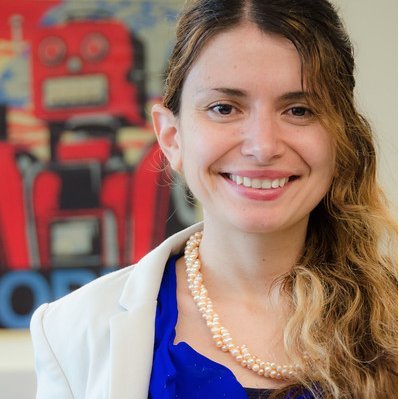
EAAMO colloquium SERIES
Upcoming Events

Samara Trilling and Johanna Monge, Justfix Discussant: Daniel Waldinger, NYU: "Type three social change: tech's role in tenant organizing at JustFix"
JustFix's work building anti-eviction web apps early in the pandemic led us to change our philosophy on how tech can best serve tenants. We experienced the mismatch between legislative and software dev cycles (not the way you'd think.), the limits of organizing within the system, and the power of open data to put external pressure on bad landlords and brokers. In this talk, we'll preview some of JustFix's new tool ideas that fit this "type three" paradigm of working outside existing systems to push for housing justice. The discussion will be moderated by Daniel Waldinger in bridging social, economic, and policy perspectives on public housing allocation.

Saiph Savage: "The Future of A.I. for Social Good"
The A.I. Industry has powered a futuristic reality of self-driving cars and voice assistants to help us with almost any need. However, the A.I. Industry has also created systematic challenges. For instance, while it has led to platforms where workers label data to improve machine learning algorithms, my research has uncovered that these workers earn less than minimum wage. We are also seeing the surge of A.I. algorithms that privilege certain populations and racially exclude others. If we were able to fix these challenges we could create greater societal justice and enable A.I. that better addresses people's needs, especially groups we have traditionally excluded. In this talk, I will discuss some of these urgent global problems that my research has uncovered from the A.I. Industry. I will present how we can start to address these problems through my proposed "A.I. For Good" framework. My framework uses value sensitive design to understand people's values and rectify harm. I will present case-studies where I use this framework to design A.I. systems that improve the labor conditions of the workers operating behind the scenes in our A.I. industry. I conclude by presenting a research agenda for studying the impact of A.I. in society; and researching effective socio-technical solutions in favor of workers.

Ingmar Weber: "Collected for Profit, Repurposed for Social Good: Using Advertising Data to Monitor International Development"
Most of the big internet companies, such as Facebook, Google, or Twitter, generate their revenue from targeted advertising. To offer advertisers with advanced targeting capabilities, these companies collect large amounts of user data to build elaborate profiles. Based on these profiles an advertiser can then choose to target only, say, female Facebook users living in Norte de Santander who are aged 18-24, who used to live in Venezuela, and who have access to an iOS device. To help advertisers in planning their advertising campaigns and the related budget needs, the advertising platforms provide so-called audience estimates on how many of their users match the provided targeting criteria. In the example above, Facebook estimates that there are 1,800 matching monthly active users (as of Mid-December 2021). In this talk, I'll describe how, in close collaboration with different UN agencies, we're tapping into these audience estimates to (i) monitor international migration, (ii) track digital gender gaps, and (iii) map wealth inequalities. We consistently find that, despite fake profiles, and noise in the inference algorithms, data derived from the advertising platforms can provide valuable information that is complementary to other data sources. So data collected for the explicit purpose of selling advertisements and profit maximization can be repurposed for social good. At the same time, our work shows the risk of identifying vulnerable groups, rather than individuals, which is often not adequately considered in discussions focused on individual privacy. Furthermore, it raises questions on what the relationship between internet giants and statistical offices should be.
Past Events
Recent talks
Medium Article - Dr. Lisa Cook
“Can mobile money be used to more efficiently and equitably distribute emergency funds to families affected by the COVID-19 economic crisis?”
Medium Article - Professor Bistra Dilkina




































